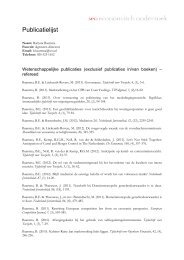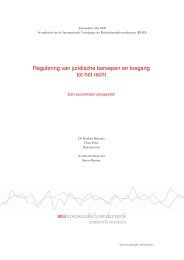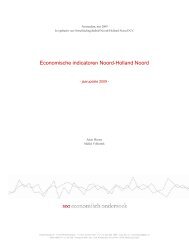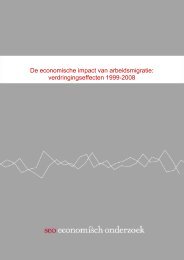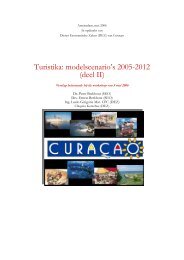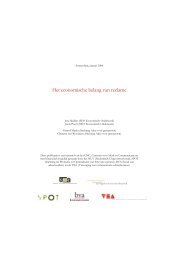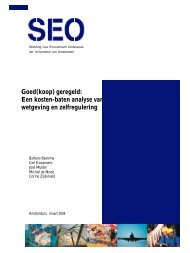Amsterdam, Netherlands - SEO Economisch Onderzoek
Amsterdam, Netherlands - SEO Economisch Onderzoek
Amsterdam, Netherlands - SEO Economisch Onderzoek
Create successful ePaper yourself
Turn your PDF publications into a flip-book with our unique Google optimized e-Paper software.
5 CONTRIBUTION TO SOCIAL, CULTURAL AND ENVIRONMENTALDEVELOPMENT5.1 IntroductionThe contribution of higher education and research goes beyond the fields of innovation and thelabor market. It is the explicit aim of this chapter to show that the impact of HEIs in the region islikewise felt in the areas of social, cultural and environmental developments. One may regarddevelopments in these areas as a form of ‘capital’ adding value to the standard productive capitalgoods, capital and labor. Their products or added value arises as indirect economic benefits aswell as in the shape of intrinsic benefits, as the OECD concluded in its report on the previousround of reviews in this program (OECD, 2007b: 166). The benefits in question concern thesupportive and stabilizing effects of these developments on economic growth and their directbenefits in terms of community health and welfare, social cohesion and a clean and healthy livingenvironment. Key issues that will be discussed in this chapter are:• The contribution of HEIs in the <strong>Amsterdam</strong> metropolitan region to social, cultural andenvironmental developments;• The role of HEIs in furthering such developments and the way they achieve this;• Regional cooperation as an instrument to further the goals of social, cultural andenvironmental development.For this purpose section 5.2 first looks into the issue of social development. Sections 5.3 and 5.4subsequently address cultural and environmental development respectively. The chapter closes bydrawing conclusions about the collaboration of the regional stakeholders, including an assessmentof the strengths, weaknesses, opportunities and threats related to social, cultural andenvironmental development (section 5.5).5.2 Social development5.2.1 Welfare state and social development5.2.1.1 Social policies as part of the economic agendaThe economic benefits of social policy is an issue that in recent years surfaced in the literature onthe restructuring of the welfare state. In modern welfare states like the <strong>Netherlands</strong> theglobalizing economy and an ageing population raise difficult questions about the future costs ofour system of social benefits and health care. It is estimated that over the next 30 years the costsof health care will rise by 4.3%-points of GDP, while public pensions cause the burden of publicexpenditures to rise by another 4.1%-point (Van Ewijk et al. 2006: 81). This causes an upwardpressure on the tax burden and the wedge between net and gross labor costs, undoing the resultsof a decades-long and painful social restructuring process. In order to remain on the competitiveedge in the global economy the Dutch social system needs to be ‘lean and mean’, which generallymeans cheap and harsh on the less well-to-do. Or is there an alternative? Recent research suggeststhat different social systems produce different results on the axis between economic growth onthe one hand and social equity on the other, and that the classical trade-off between economicefficiency and equity need not necessarily obtain (De Mooij, 2006). The strong economicperformances of the Nordic countries of the past 15 years underpin this finding (Aiginger, 2005).They form corporatist societies with a strong role for the state and its accompanying high taxburden. Nonetheless, before the current economic crisis countries like Finland managed toproduce above-average per capita economic growth with high R&D-investment and solid publicfinances. The success brings some to support the notion of a Nordic social model, just like theDutch ‘polder’ model was once held out as an example (Visser and Hemerijck, 1997).107






